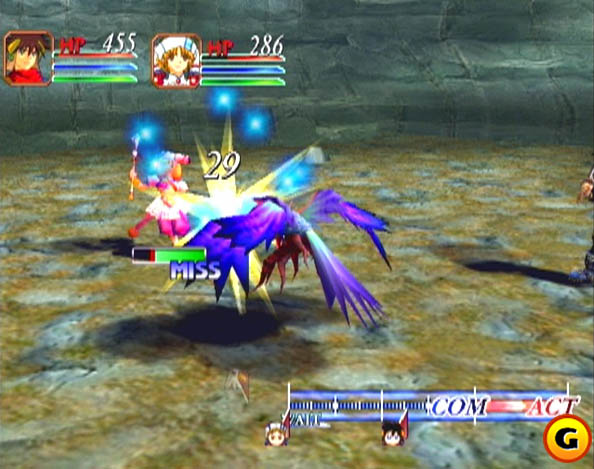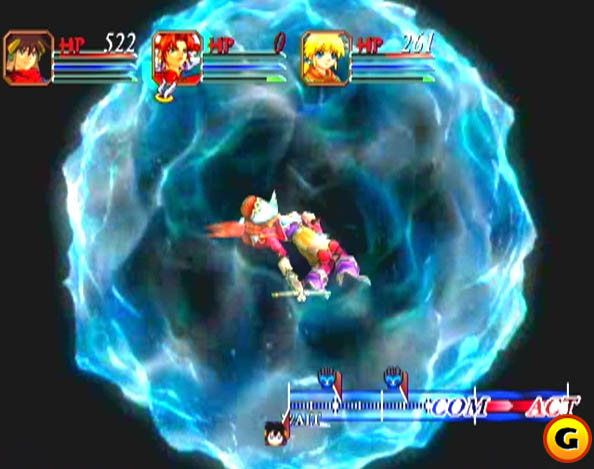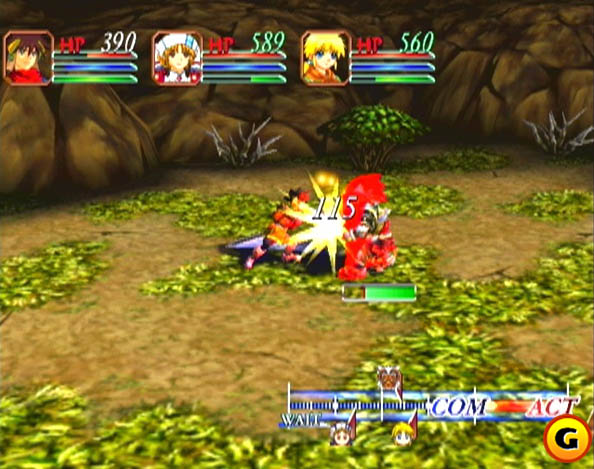Grandia II (2000) 
| Details (Sega Dreamcast) | Supported platforms | Artwork and Media | |
|---|---|---|---|
| Publisher: Genre: Author(s): Maximum Players: Joysticks: Language: Media Code: Media Type: Country of Release: Comments: |  Ubi Soft Ubi SoftRole-Playing Game Arts Sega Dreamcast Controller Eng T-17715D-05 USA, Europe, Japan | Sega Dreamcast |
| Videos | Screenshots (Sega Dreamcast) |
|---|---|
| (no videos on file) |
Please login to submit a screenshot
| Your Reviews |
|---|
 Aganar (Unknown) 1st Jun 2012 04:10
Aganar (Unknown) 1st Jun 2012 04:10"A fun Dreamcast RPG with an amazing battle system to boot!"
When I started reading about it, Grandia II quickly became one of my most wanted games. No matter where I went, I would hear "This game might have its flaws, but I think we can all agree this has the best battle system of any RPG." To me, this was something phenomenal. I'm not one who really cares a huge amount if a game's story is a bit on the weak side. I love gameplay RPGs. So, naturally, when I got my hands on this I was very eager to go through it. After getting through it, I like it a good deal, but I'm slightly disappointed by it.
It's not at all a bad game. In fact, there isn't too much wrong with it. It just experiences a few flaws here and there. But to start it off, the game looks pretty good. By today's standards it has low polygon-counts, blurry textures, and some irritating load times. But, given four years ago, the game set fairly high standards for RPG visuals. Many of the cities you travel through have roofs that look almost completely curved at times (something fairly unheard of until Quake 3's curved surfaces arrived). The main cast of characters, while not particularly detailed, manages to look good while not looking too deformed in the process. I would've liked them to be a little more proportional, but it could've been worse. I am somewhat irritated that the game, at points, had pop-up, which ended up getting me into several battles I could've avoided had I been able to see the monster. This is a somewhat minor complaint, but when it affects the gameplay I consider it worth mentioning as a problem.
However, while the game may not have exceptional polish in the game outside of battle, special effects inside of battle are a completely different story. Visually the thing that blew me away most about Grandia II was the amount of work that was obviously put into the attacks. While some might just be "pretty effects", a wide variety of attacks use short rendered cinemas. A lot of them look simply amazing, and I found myself using a bunch of them, as costly as they were, very frequently just to get to watch these. The most interesting ones I found were ones which temporarily switched to anime cg, creating a strange animated effect onto the screen. It looks rather strange but at the same time very enthralling.
While eye-candy is always a nice plus to a game, even in Gameplay RPGs you need something to keep you going. Grandia II managed to keep me thoroughly entertained during most of the story, leaving me wanting to know what happened next. The primary cast of characters is a likeable bunch, most of which are common anime stereotypes. You have you main character, Ryudo, a "Geohound", and his adventure with the holy songstress, Elena. Although we frequently see that Geohounds are disliked and viewed as trash, we are never really told exactly what they are. My guess is they are just specialized mercenaries. With Ryudo travels his companion bird friend, Skye. The game starts with these three characters going on some quest which eventually incorporates several more companions. Your cast list maxes out at 4 (only 6 total), which I look upon as something good due to the game's short length. More characters would've probably hindered their development. While none of the characters are particularly deep, they're all round enough to seem a bit better than the one-dimensional characters that you come across in other Gameplay RPGs like FFV.
Each of the characters also has some voice acting to them, as well as a few choice FMVs to see them in. For the voices, it appears they got the Metal Gear Solid team (I'm almost positive that's Colonel Campbell doing Skye). And, while the voice acting is decent at times, a lot of times it sounds very artificial. Excluding battle, their cutscene acting sounds very amateurish. Ryudo comes across as a sort of emotional robot which can deliver speeches in "Angry", "Bewildered", or "Monotone" tones. The same goes for the rest of the cast. Maybe had there not been such long pauses between them it might have been less noticeable. Another large factor which somewhat damages the voice acting is that it seems to come and go at completely random times. Though they are all story events, some lines, which are somewhat unnecessary, are spoken, while lines that I thought had a much greater impact on the characters remain to be read.
Then there's the story, which is probably the game's biggest flaw. What's most irritating about it is that the story isn't that bad, but the way it's done leaves a larger reason for complaint. It all starts typically enough, with talk of an ancient war dealing with the divine god Granas, and the evil god Valmar. Ryudo is told to act as Elena's bodyguard while escorting her to a ceremony to rid a castle of the evil of Valmar. When the ceremony goes wrong, Elena is possessed by a piece of Valmar, giving her a strange alter ego (who, oddly enough, ends up becoming a main character and possesses Elena frequently at choice points throughout the game). Ryudo, Skye, and Elena then proceed to journey on their quest to see the Pope in hopes of ridding the piece of Valmar inside Elena. The story moves on, gets a tad bit more interesting, has some nice plot-twists here and there, and builds up to something trying to be epic.
Unfortunately, it's not. Game Arts can't seem to decide what kind of game they were making when they designed the story. Grandia II's story seems torn between trying to be one of these "deep" epics like Xenogears or Final Fantasy VII by throwing in all of this questioning of God and power, while at the same time acting very light-hearted. To make matters worse, they decide to give the characters moralistic and philosophical speeches which never really seem to fit. So, you are constantly wondering if this game is trying for the light-hearted style of Lunar and Chrono Trigger, or if it's going for the more serious approach. At times, you may see children being slaughtered, people committing suicide, or horrific flashbacks; then at the same time you may see characters running around with the typical happy anime icon as they chant about pointless nonsense to each other. Ultimately, you wind up with a story-line that seems pretentious and at the same time fills us with the typical Japanese humor (that is: "Watch a guy make a comment then have everyone laugh in unison at him").
This would not be so bad if Game Arts didn't try to make the game engross you so much into it. When you play a game that makes you want to know what happens, you expect it to be good. In some ways I actually end up preferring the bad story of Final Fantasy V or the nonexistent story of Pokemon to this! Why? Because at least in the other ones I didn't care. This is the gaming essential of something like Donnie Darko, as opposed to a simple entertaining movie like Blade. As long as they're making the effort to provide semi-interesting cutscenes and fights to keep me interested, giving me this pseudo-epic Chrono Trigger esque RPG that then tries to be Xenogears hurts alot more than a game that doesn't really try to have a very deep story (or if it does, it succeeds).
But, I'm making it to be a larger problem than it really is. Because if you're playing Grandia II, you're obviously doing it predominately for it's gameplay. And, I will say that Grandia II does posses the best turn-based battle system ever to grace an RPG. The ingenious system utilizes more than just the attack options. It takes into account everything about your character. It depends upon how fast your character can run, how fast your character can act, and how fast your character can attack. Every attack must be physically done. Thus, once an enemy's time bar is filled up and he chooses an attack, he has to physically walk up to your character and bash them in the face. This can lead to a bunch of interesting scenarios. When starting out, you only have two attack commands: Combo and Critical. A combo attack hits a certain number of times (usually two unless you have a special accessory), and will do more damage to an enemy. A critical is only one attack, and does less damage. However, if an enemy is in the process of charging up an attack or walking up to attack a friend, the Critical can attack them off-guard and cancel out their attack. Thus, you now have a totally new dimension to the combat in the game. It adds a huge level of strategy to the game which will keep you constantly on your toes, and stop you from simply hitting the "Combo" button over and over. You have to know how to keep your characters balanced, and to round off their flaws if one character takes forever to attack, or one takes too long to react. This can also make battles extremely amusing to watch if you ever happen to have an extremely fast character zooming around the field, canceling enemy attacks.
In the same lure of Final Fantasy VII and VIII, the magic system allows your characters to be completely customizable. Over the course of the game you will, among other things, primarily collect two major types of items: Mana eggs, and books. Mana eggs are equipped to a character. Once equipped, they have access to all of the attacks within that egg. However, the eggs have to be developed. To progress the egg, you gain Magic Coins from enemies as part of your battle experience. These coins can then be used to increase the power of the mana eggs' abilities, and over time allow new spells to be learned. Similarly, there are books which deal with character's stats in general. The Book of Warriors, for instance, may contain things that can be junctioned to a character to give him more life, or better speed. These are powered up using Skill Coins (which are also used to build up your characters' special attacks).
The magic system can allow you to pretty much use any character however you want to. You can let your deadliest fighter at the same time be your most powerful magic user. Or, you can let your powerhouse warrior be your healer. It doesn't really matter; your character's specific stats are not hindered at all by the mana eggs they use, though some eggs seem to "fit" certain characters. I'm a huge sucker for customizability, so I love this system. There is little more satisfying than playing around with fully powered-up eggs and books and watching my abilities reach unimaginable power. The gameplay is, however, riddled with a few flaws. It is somewhat unfortunate that if you take the time to put an extra 10 minutes into leveling up at each dungeon, the game will be ridiculously easy. And by ridiculously easy, I mean that you will go through the entire game without using items. You may get a game over twice at the max. Boss battles may seem hard, but really they're just long. You're never really in a position where your characters are close to dying. However, this does not stop the game from being a blast to play. When the Bosses are not overflowing with body parts to kill and you are limited to just one or two, they can be some of the most exciting RPG battles you'll ever run across.
Beyond building up the mana eggs or books, there is little to do in the game. There are a few "hidden" eggs and books, but once found that's virtually it. Miniquests are almost nonexistent, and most of the final equipment can be found in the last dungeon. So, there isn't too much to do once you've played through the thing.
When I went through the game, I was hearing a lot of hype about the game's soundtrack. Many people compared it to the better Final Fantasy soundtracks, and claimed it was one of the best around. Honestly, I have no idea where any of these claims come from. The music is decent, if not forgettable. There simply wasn't a huge amount of music I found particularly interesting. Besides the very nice vocal theme at the end, the only tracks of the game that really stood out to me were the hymns scattered throughout the game. These were nice, as were a few location themes, but a lot of it remained somewhat mediocre.
Alas, Grandia II remains somewhat disappointing. I enjoyed playing through it and it still blows me away when I get into a battle, but its flaws prevent it from being something I'd consider quite on par with the better games of Square. The half-n-half story ends up bringing the whole game down a bit, and minor flaws meddle with the game's lack of polish. As a Gameplay RPG, I am still inclined to say it may be the best around. But, among real RPGs it falls just short of the "Hall of Fame" cut-off. I do, however, believe this does hold the pinnacle of RPG battle systems, and hope that other games will begin incorporating a system such as this to hopefully create much better games. If flawed Grandia II still winds up a great game, innovative and still fun enough to deserve a sequel.
Final Score: 8.4
Reviewer's Score: 8/10, Originally Posted: 05/25/04
| Cheats | Trivia |
|---|---|
| There are no cheats on file for this title. | No trivia on file for this title. |
History
This title was first added on 22nd February 2007
This title was most recently updated on 1st June 2012










